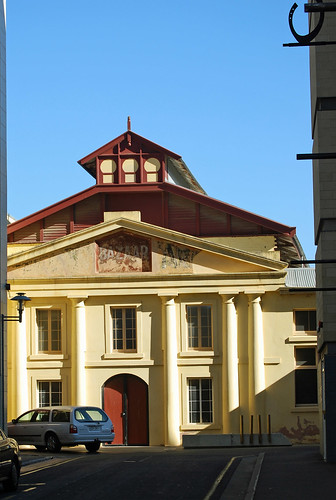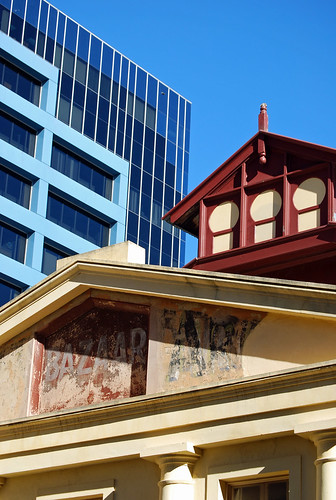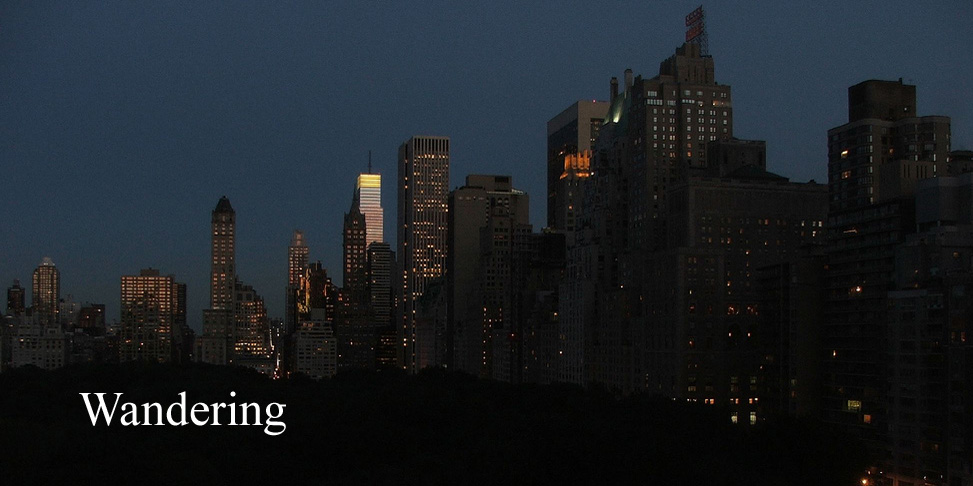
Queen's Theatre Adelaide
While visiting Adelaide, I was fortunate to see a production of Shakespeare's The Life and Death of King John by The Eleventh Hour. The Eleventh Hour is a theatre company from Fitzroy in Melbourne.
I suppose I had heard of King John, but when I found that it was on in Adelaide during my visit, I couldn't bring anything about it to mind. The King John of history and myth was lost to my memory as well, and I had to remind myself of Magna Carta, Runnymede and the adventures of Robin Hood (none of which are in Shakespeare).
It's said that performances of King John are rare these days, although the play was popular in the nineteenth century when pageantry, and elaborate scenery and costume were more in evidence. It gave scope for all of these. It may also be that King John loomed larger in the imagination of people at that time; historians of the period treated him as the personification of evil. William Stubbs, professor of modern history at Oxford, described the him as not only as " the very worst of our kings" but also "polluted with every crime" and "false to every obligation". Still under this influence, A.A. Milne taught us that " King John was not a good man-..." I suspect that for the 19th century actor John was what Richard III became in the hands of Laurence Olivier. If you look at the old silent film of Beerbohm Tree performing the death of King John, which was shown in the foyer in Adelaide, you get some sense of this I think.
For those interested, there is a debate about the source of Shakespeare's play and whether it followed in time, and drew upon, the anonymous play The Troublesome Reign of King John or whether Shakespeare came first. Whatever the answer to this, the play is not very coherent, it conflates some incidents from history and jumps forward in time without explaining that it is doing so. King John reigned from 1199 to 1216. The first four acts of the play are chiefly concerned with John's dispute about the inheritance of the Crown with Arthur, Duke of Brittany; or more accurately since Arthur (born 1187) was a youth at the time, with his supporters. This dispute ended when Arthur vanished mysteriously in April 1203 ( in the play he falls, or jumps, from a wall after John's unsuccessful attempt to murder or blind him.) Then the last act depicts the events leading up to John's death in 1216. There is no sub-plot or elaboration, just the rather tortured narrative and countless battles. But a reading of the play does give a feeling of Shakespeare, the working dramatist of great linguistic facility, working against time to get the thing ready and onto the stage.
Stories about the inheritance of royal power were relevant to the politics and events of Shakespeare's time, but are not of pressing concern now.
The Eleventh Hour has tackled the plays difficulties by setting its production in France on the last day of the First World War. It's not simply a production in modern dress. The company, ( I assume its dramaturge William Henderson ) has written a play set on that day in the course of which Shakespeare's King John is performed.

The performance took place in Queen's Theatre in Playhouse Lane, Adelaide. The name suggests a delightful old traditional theatre, but that's not what I found. Although there has been a theatre on the site since 1841, the building, or what remains of it has had a variety of uses over time. The word BAZAAR in faded paint is the only name on the facade. At some stage it was "horse bazaar", I assume a kind of market. All that lies behind the facade is a large space. This is currently used for functions or as a performance space, each user adapting it to their own needs.
A large room to the side was used as a foyer and Shakespeare Tavern; and when it was time for the play to begin the audience was led from there to a side door of the theatre proper, offered paper Chinese fans against the heat, and shown to a steeply raked temporary grandstand structure which held just over a hundred seats. The bank of seats faced back towards the building's facade.
The space between the seats and the front of the theatre was converted to an elaborate set, depicting a barn near the trenches of 1918. To imagine the set, you must forget the usual kind of stage design. The old building was converted into the barn: spaces in the existing wall had been built up and accurately matched with existing structure to show shell damaged walls. Old carts, wheels, barrels and boxes were placed realistically around the "barn" and straw littered the floor. There is a sound design which reproduces the sound of nearby artillery, aircraft and exploding shells and bombs.
The play begins with the entry of a group of soldiers blinded by gas wearing eye bandages, together with three women, two ambulance drivers and an army nurse. The group has sought shelter in the barn, and are soon joined by a badly wounded officer and a chaplain.
This sets the scene for a theatrical device which if simply described sounds contrived and wholly incredible, but which, surprisingly, led to a fascinating and absorbing performance. The nurse, Matron White, suggests to the group that to keep the Captain's spirits up, they should perform the play they have been rehearsing - King John, of course. The Captain is King John. It could be that soldiers at the front in the First World War did some playacting to pass the time, I don't know; but did a group of walking wounded ever learn King John? However, once we take this jump, the strengths of the idea begin to work.
I am totally sick of the convention of placing historical plays and operas in modern times, and the variation of equipping ancient warriors with sub machine guns, with the purpose of teaching those of us lacking the insight and virtue of the Director that war is and was evil and destructive. The improbable device used here managed to skirt a didactic onslaught and instead provided some real insights and emotional force.
The idea drew on some parallels with the plot of King John. As a map in the foyer reminded us, the trenches in France were close to where the action of Shakespeare's play took place. And the futility of that war seems close when Lewis, the dauphin says of a battle:
And now 'tis far too huge to be blown out
with that same weak wind which kindled it.
The gas blinded soldiers give an edge to Shakespeare's very effective scene in which Hubert, acting as the king's henchman, prepares to blind the youthful Arthur with hot irons. In a performance in which all the actors were excellent, Michaela Cantwell (alias Lieutenant Violet O'Faolain, Ambulance Driver) gave a most affecting performance as the troubled and vacillating Hubert. The idea of Hubert being performed by a woman was another bit of the mysterious alchemy which gave this show such emotional force.
Shakespeare's play was interrupted from time to time by episodes in the story of soldiers who were performing it. This did two things. First, it provided another parallel with the old play by showing the stresses which work on wounded and war weary soldiers to produce tension and acrimonious exchanges. But more importantly it gave an impetus to the production which would be difficult to achieve from the text of King John itself. The performance of King John became the driving force of the soldiers' existence: when things got too hard to bear there was always THE PLAY. It became more important to them than issues of life and death, injury, pain and distress.
My only reservation about the performances was that the soldiers developed more identifiable personalities than some of Shakespeare's characters. This might be a fault in King John itself, though I imagine it might be overcome if various of the disputing nobles were given very distinctive costumes. Here they were all in regulation army issue.
One of the ambulance drivers had set up a field telephone which relayed messages from Marshall Foch and General Haig about the armistice to take place at the eleventh hour that day. This also provided some drive to the proceedings; and it was no surprise when the church bells celebrating the end of hostilities accompanied Richard's concluding speech:
This England never did, nor never shall,
Lie at the proud foot of a conqueror,
...Nought shall make us rue
If England to itself do rest but true.
King John has died, one line of the play explaining that he was poisoned by a monk. This has some point, as during the play John has anticipated Henry VIII by seizing the wealth of the monasteries to finance his battles. No one knows why John died, but I prefer Holinshed's story that his death followed "increased feeding on rawe peaches, and drinking of new sider". No sooner has the Captain delivered John's final lines than he himself falls off the cart on which he rested, dead. I don't want to quibble with such a fascinating production, but this was not difficult to predict.






No comments:
Post a Comment